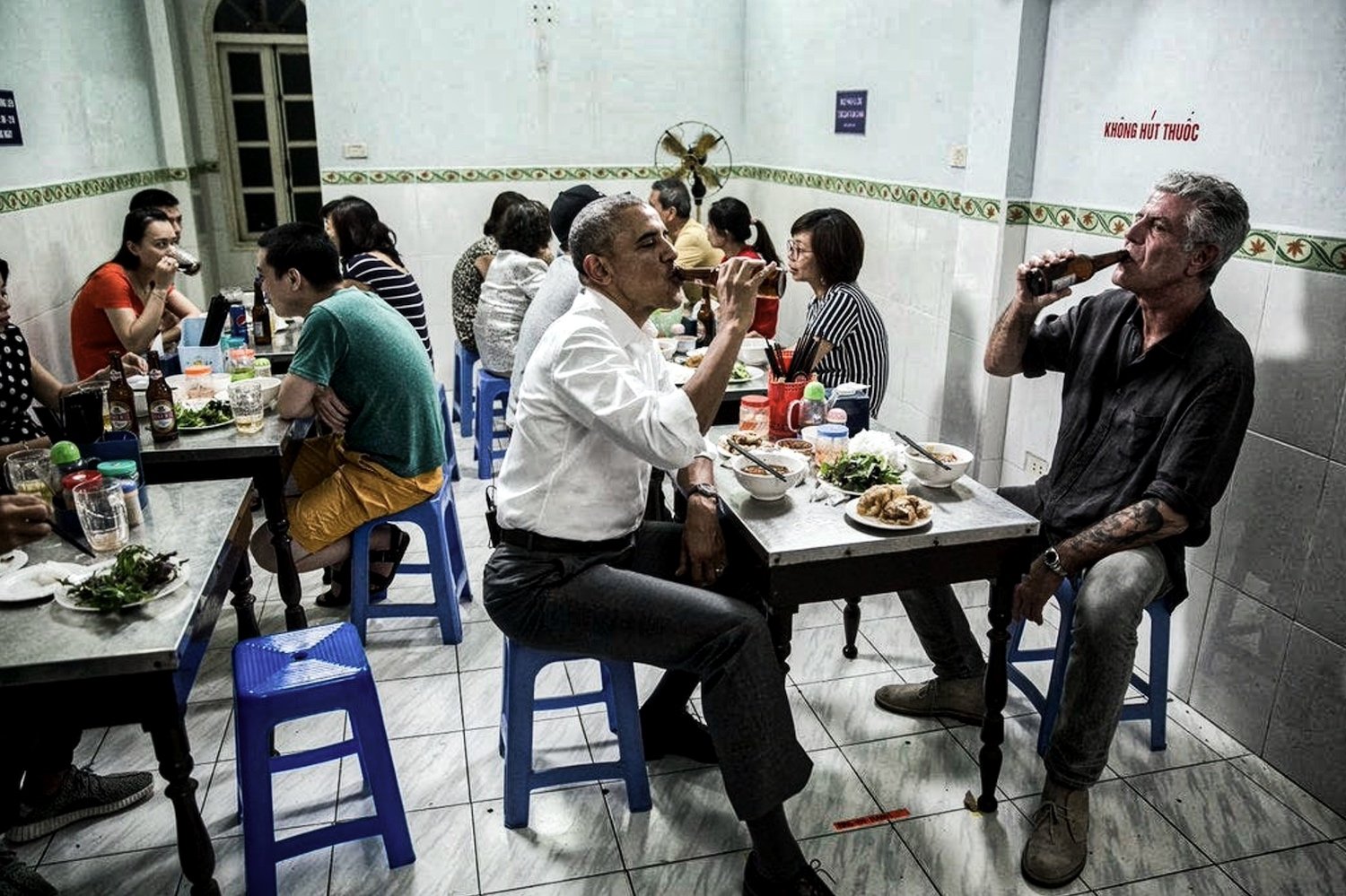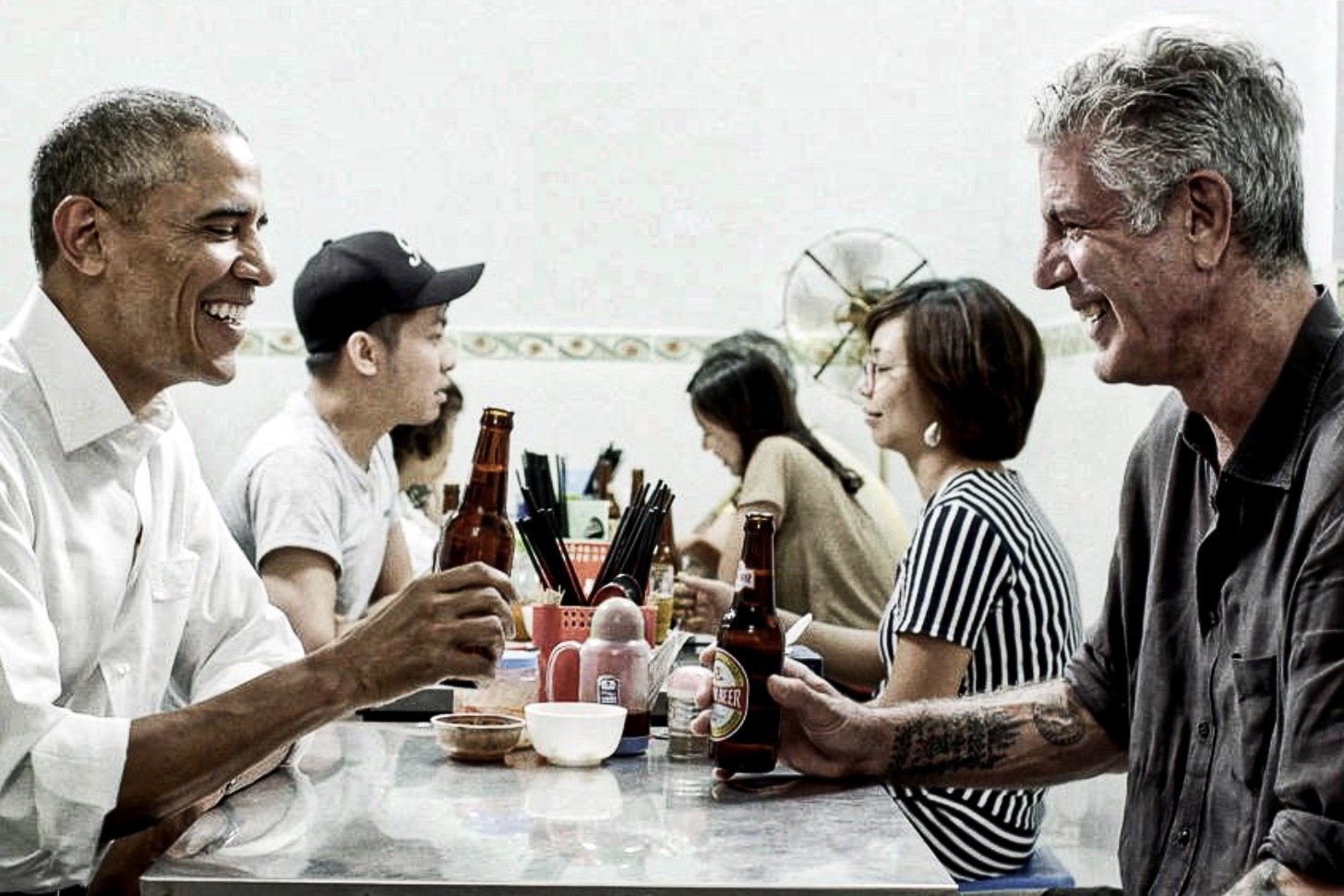September, 2016. Be warned. You're now entering Anthony Bourdain's "place of dreams; my spirit house. A city of ghosts:” Hanoi, Vietnam. And a talk about fathers and daughters over a bowl of bun cha noodle soup with former US president Barack Obama.
Learn from yesterday, live for today, hope for tomorrow. The important thing is not to stop questioning.
Einstein said that, but it could just as easily have been Tony Bourdain.
“You like food and are reasonably nice at the table? You show me hospitality? I will sit down with you and break bread.”
Bourdain did say that — he wrote it in his Sept. 25, 2016 essay for Medium — in his telling account of how his famous sit-down with then-President Barack Obama over rice noodles and pork meatball soup at Bún Chå Huong Liên noodle shop in Hanoi, Vietnam. “Located in the old part of Hanoi,” Tom Vitale writes in his book In the Weeds, (Hachette, 2022) about his decade of experiences co-producing and directing CNN’s Parts Unknown alongside Bourdain in countless noodle shops and sit-down eateries around the world, “it was so much more visual and in line with the ethos of the show than the safe and sterile locations where the Secret Service wanted us to film. But who were we to interfere with their judgment?”
Well, the makers of the show, for one. Obama had just five months remaining in his two-term presidency and he was in his legacy phase. Vietnam was arguably Bourdain’s favourite country outside his own home and native land, certainly the most formative in terms of his TV travels, and Vietnam was also the locus of a defining moment in US history and foreign policy. Symbolism, much?
“I’m not a journalist,” Bourdain wrote that weekend in Medium. “Or a foreign policy wonk. My politics are my own. Contrary to the assertions of angry Twitter warriors who think I’m getting regular guidance from the ‘Communist News Network,’ I’ve never once received a phone call or an email or had a conversation that contained the words, ‘Wouldn’t it be a great idea if…’ or, ‘How about?’”
As it turned out, the episode Hanoi would open Parts Unknown’s eighth season, by which time Parts Unknown was in its pomp, as the Brits say, a global phenomenon in its own right that was weekly appointment television wherever CNN’s signal reached — which, basically, is the entire planet.
The episode is familiar enough — at least to those in this group — that I don’t need to repeat it here, except perhaps at the very end. A coda, if you will, a look back at yesterday, a moment for today, and a sign of hope for tomorrow.
“Though I may admire him,” Bourdain continued, “I wasn’t going to be a platform for discussion of a particular foreign policy agenda. Barack Obama was apparently interested in sitting down for a meal with me — and I intended to speak to him only as a father of a 9-year-old girl, as a fellow Southeast Asia enthusiast (the President spent time in Indonesia as a young man), and a guy who likes a bowl of spicy, savoury pork and noodles with a cold beer.”
Vitale’s riveting account of the meeting’s filming — tense, funny, chaotic, impressive, insane, wonderful and terrifying by turns, and fascinating in its detail — tells the less familiar story of how the sausage was made for television. In a chapter titled The Quiet American, after the Graham Greene novel (Heinemann, 1955) about the breakdown of French colonialism in Vietnam and early American involvement in the Vietnam War, Vitale writes about how he reached the point nervous breakdown — “Yes, the Bun Cha restaurant (is) amazing, but I don’t know; the place has got to be a firetrap. If one of those woks burst into flame, we’d all be f**ked!” — fretting about everything that could go wrong, from clumsily using expressions like “shoot” and “windows” and “line of sight” in front of horrified White House liaisons to a clandestine pre-show meeting with “Mitchell,” the head of Obama’s security detail that day, “a very serious-looking Secret Service agent … wearing dark aviator sunglasses and a Hawaiian shirt. The whole thing reminded me of some sort of B-movie spy thriller. I was about to say as much when I thought better of it.”
Wise move. ”Mitchell” was one those the no-nonsense types. “You’ll have forty-five minutes with the president beginning at seven-thirty p.m.,” he told Vitale and the episode producers in no uncertain terms. “Local Vietnamese authorities will be performing security checks throughout the day and then begin shutting down the area surrounding the restaurant in the early afternoon.
“So anybody and anything you want there needs to arrive by one p.m.”
Everyone. That meant including Bourdain.
Yes, that Bourdain. The Bourdain who was used to showing up ten minutes before filming started on any given scene.
How much would he get wound up if he had to sit there for six hours, fretting over every small detail. What could possibly go wrong?
Plenty, as it turned out, from a bum air conditioner that needed to be replaced for filming lest the crew — and Obama — die from heat exhaustion, to a makeshift lighting rig (for the cameras) that suspended heavy lights from a concrete support beam that hung precariously over Bourdain and Obama’s heads, where the whole assembly could come crashing down at a moment’s notice.
“Enough people had been put in harm’s way over the years as we pushed boundaries with the show,” Vitale writes in his book, “and I wasn’t eager to add the leader of the free world to that list. In fact, it was keeping me up at night. At the same time, I was terrified of under-delivering with the stakes so high.”
”It’s strong, don’t worry,” veteran cameraman Zach Zamboni told him. “Don’t worry!”
Don’t worry, be happy!
“My mind involuntarily ran through a laundry list of worst-case scenarios,” Vitale continued, his fears going from bad to worse. Metastasizing, even. “What if someone picks up a chopstick and stabs the president through the ear before the Secret Service could do anything?
“What if Tony only talks about Richard Nixon’s obsession with cottage cheese? Are we going to get a scene out of this?
“And is that guy who carries the nuclear football going to be here?”
Bourdain wasn’t taking his forced six-hour wait well either. Six hours is not ten minutes. Six hours is a long time to brood.
“I noticed Tony was sitting by himself at a table in the corner looking withdrawn and nervous,” Vitale continued. He was never at his best around famous people, but his expression today was extremely unusual and unpleasant. I went and sat down across the table … “
“Make sure to get a good picture I can tweet,” Bourdain told him, an or so hour later, as Obama was arriving.
The picture worked, as it happened, and the tweet went out:
“Total cost of bun cha dinner with the President: $6.00. I picked up the check. #Hanoi.”
Vitale: “I chuckled at that. Regardless of how you did the accounting, the meal had cost far more than six dollars. When you think about the production costs to cover crew, things like equipment, airfare, lodging, not to mention the fee for commandeering a restaurant. There was the money expended by the Vietnamese government in security personnel required to lock down a quadrant of Hanoi. Then of course there was the Secret Service and presidential entourage followed by the press pool of at least seventy, the jet fuel to move everyone and the motorcade, all the salaries plus the cost to rent the JW Marriott. I’m guessing the cost of that meal could easily have surpassed the annual GDP of a small nation, and now, having survived the experience, as far as I was concerned, it was worth every penny.”
As for hope, well, there’s this, as anyone who’s seen the episode will recall.
Obama to Bourdain: “This is why a show like yours is terrific. Because it reminds people that actually there’s a whole … world that on a daily basis is going about its business, eating at restaurants, taking their kids to school, trying to make ends meet, playing games. The same way we are back home.”
Vitale: “I’d been worried Tony would choke and totally flub the interview, but it appeared Tony had, in fact, known what he was doing. It was actually so beautifully simple. Just two dads hanging out, having some noodles and a beer in Vietnam.”
Bourdain to Obama: “As a father of a young girl, is it all going to be okay? It’s all going to work out? (Will) my daughter be able to come here. In five years, ten years, twenty years, (will) she be able to have a bowl of bun cha and the world will be a better place?”
Obama: “I think progress is not a straight line, you know? There are going to be moments in any given part of the world where things are terrible. Where tragedy and cruelty are happening. Where our darkest impulses pop up. I think there are going to be some big issues our children are going to have to address, because we didn’t address them.
“But, having said all that, I think things are going to work out. I think the world’s a big place, and I believe that people are basically good. I think humanity is still in its awkward adolescent phase, but it’s slowly maturing, and if we get a few big things right, I think we’ll be all right.”
That’s as good a thought as any to end on.
Photo credits: key art, Pete Souza, official White House press photographer for Barack Obama.
Other photos: David Scott Holloway, personal photographer for Anthony Bourdain, ZPZ Production and CNN.
Supplementary reading:
https://medium.com/parts-unknown/hanoi-326e00642e18
https://eatlikebourdain.com/anthony-bourdain-in-hanoi/
https://vietnam.travel/things-to-do/eating-vietnam-anthony-bourdain


